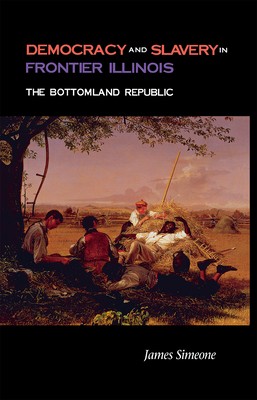
- We will send in 10–14 business days.
- Author: James Simeone
- Publisher: Northern Illinois University Press
- ISBN-10: 087580263X
- ISBN-13: 9780875802633
- Format: 16.2 x 23.8 x 2.6 cm, hardcover
- Language: English
- SAVE -10% with code: EXTRA
Reviews
Description
During the 1820s, Illinois witnessed one of the earliest and most important battles between slavery and antislavery forces in the new American republic--one that unleashed riots, arson, and mob violence across the state. In this deeply researched and finely argued book, James Simeone contends that the contest over slavery in Illinois prefigured the course of national politics up to the Civil War, revealing the complexity of the slave problem in the early republic. In attempting to bring slavery to a free state, white migrants from southern states hoped to create a Bottomland Republic of free and equal white yeoman farmers who could own slaves on the basis of "popular sovereignty." Abolitionists thus found themselves allied with the governing class of "aristocrats" against the upstart, proslavery migrants. The struggle permanently changed the state's political culture and foreshadowed the Democratic-Whig cleavage in antebellum politics by posing questions of regional and sectional identity, of the relation between republicanism and the market, and of the role of religion in public life. Democracy and Slavery in Frontier Illinois reveals the paradoxes within the quest for a democracy that also fostered slavery. Placing early Illinois politics in the context of the national politics of the Jacksonian era, it will appeal to readers interested in the political development of the early republic and the midwestern frontier, the roles of race and class in constructing political identity, and the nature of liberal democracy in nineteenth-century America.
EXTRA 10 % discount with code: EXTRA
The promotion ends in 21d.02:19:07
The discount code is valid when purchasing from 10 €. Discounts do not stack.
- Author: James Simeone
- Publisher: Northern Illinois University Press
- ISBN-10: 087580263X
- ISBN-13: 9780875802633
- Format: 16.2 x 23.8 x 2.6 cm, hardcover
- Language: English English
During the 1820s, Illinois witnessed one of the earliest and most important battles between slavery and antislavery forces in the new American republic--one that unleashed riots, arson, and mob violence across the state. In this deeply researched and finely argued book, James Simeone contends that the contest over slavery in Illinois prefigured the course of national politics up to the Civil War, revealing the complexity of the slave problem in the early republic. In attempting to bring slavery to a free state, white migrants from southern states hoped to create a Bottomland Republic of free and equal white yeoman farmers who could own slaves on the basis of "popular sovereignty." Abolitionists thus found themselves allied with the governing class of "aristocrats" against the upstart, proslavery migrants. The struggle permanently changed the state's political culture and foreshadowed the Democratic-Whig cleavage in antebellum politics by posing questions of regional and sectional identity, of the relation between republicanism and the market, and of the role of religion in public life. Democracy and Slavery in Frontier Illinois reveals the paradoxes within the quest for a democracy that also fostered slavery. Placing early Illinois politics in the context of the national politics of the Jacksonian era, it will appeal to readers interested in the political development of the early republic and the midwestern frontier, the roles of race and class in constructing political identity, and the nature of liberal democracy in nineteenth-century America.


Reviews